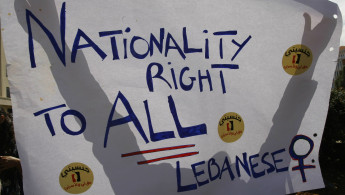Lebanese women demand urgent reform of misogynistic nationality law
Dozens gathered in Beirut's Riadh el Solh square and called for an urgent amendment to the Lebanese Nationality Act of 1925, which rules that citizenship can only be transmitted paternally.
Lebanese women who have foreign spouses or have children from non-Lebanese partners must routinely apply for permits to allow their husbands and children to remain in Lebanon.
Legal documents are also required for their access to employment, education, social services and healthcare. The law leaves children of such marriages at risk of statelessness.
While women's rights organisations have long called for its reform, the outdated nationality law still remains in force.
A coordinator of a campaign that organised Sunday's protest, Karima Chebbo, spoke to The New Arab about new moves to repeal it.
"It is shameful that this misogynistic law still stands unamended in Lebanon today," Chebbo said.
"We speak of being a progressive country in the region, but women here are still fighting for their basic rights."
Twitter Post
|
Chebbo is the nationality campaign coordinator for the non-profit organisation Collective for Research and Training on Development (CRTDA), which centres its work around gender equality.
"As you saw on our rally invites, we did not say we are marking the occasion of International Woman's Day or Mother's Day, because we cannot celebrate these events when we do not receive our basic right from the state," Chebbo said in her address at Sunday's rally.
"We demand full equality between men and women," she added. "It is time to amend this obsolete law!"
"This square has become our space now, but we hope we do not need to keep coming here!"
The question of equal citizenship rights has been a vocal subject for campaigners in Lebanon over the past decades.
Recently, Lebanese MP Hadi Abou Hassan proposed an amendment that allows Lebanese women to pass on their citizenship to their children from foreign spouses.
While Chebbo and the CRTDA call on the Lebanese government to consider Abdul Hassan's proposal, there are many on the other side of the divide who want the status quo to remain.
Critics of the campaigners claim that any changes to the 1925 law will interfere with the country's delicately balanced sectarian demographic.
Chebbo strongly disagrees. "The excuse that giving women their right to pass on their nationality will affect the demographic balance is unfounded," she told The New Arab.
"Firstly, it means that they are worried that one sect will be larger than another. Are they suggesting that there is a balance between all 18 sects that exist in Lebanon today?
"Secondly, if they amend the nationality law, how will the alleged balance be disturbed? These are simply baseless excuses!"
Politicians also contend that amending the nationality law will enable Palestinian and Syrian refugees married to Lebanese women to become naturalised.
They argue it is important for Palestinians and Syrians in Lebanon to keep their refugee status in order to maintain the right to return to their homelands.
"Again, that is another baseless excuse, because a Lebanese man can marry a Syrian or Palestinian woman and give her his citizenship," Chebbo said. "If keeping their refugee status is a real concern, then a Lebanese man should not be able to pass on his citizenship to a Syrian or Palestinian woman."
A 2016 census of Palestinians in Lebanon found that there were just over 3,000 cases of Palestinian men married to women of a different nationality.
"The Palestinian refugee case is an excuse used by misogynistic politicians who want to see the Lebanese woman remain a second-class citizen, who should not be able to make her own choices over who to marry and start a family with," Chebbo said.
While there is no data available on the number of Lebanese women married to foreigners or on the number of children the law affects, a 2009 UN Development Program-backed study found that there were 18,000 marriages between Lebanese women and foreign men in the country between 1995 and 2008.
For Chebbo, the numbers do not matter.
"Whether there is one case or thousands of cases of Lebanese women affected, the law remains unfair on women," she told The New Arab. "The numbers do not matter. What matters is that there is a law that gives privileges to Lebanese men over women. We demand equal rights."
Most countries in the region have recently reformed their nationality laws to allow citizenship to be passed through mothers as well as fathers. These include Algeria, Egypt, Iraq, Morocco, Tunisia and Yemen.
Lebanon remains one of 22 countries in the world where nationality law gives privileges to men over women.
As the world celebrates International Woman's Day, Lebanese women continue to raise their voices and fight for their right to equal rights of citizenship.


![Minnesota Tim Walz is working to court Muslim voters. [Getty]](/sites/default/files/styles/image_684x385/public/2169747529.jpeg?h=a5f2f23a&itok=b63Wif2V)






